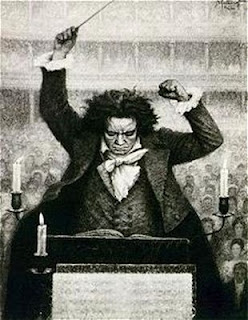It is widely attributed that Beethoven’s loss of hearing was actually what is today known as tinnitus. This means that Beethoven’s loss of hearing was most likely caused by a loud constant ringing in his ears that drowned out his ability to hear any sound. Due to the primitive time period in which Beethoven lived, there were not yet any aids to help him deal with his loss of hearing. Thus Beethoven was forced to suffer in silence as he tried to continue performing live in concert halls.
 There are
many people who attribute Beethoven’s loss of hearing to syphilis or to
hereditary factors. as the records are somewhat blurred and it is hard
to pinpoint now what may have caused the condition. It is also rumored that
Beethoven’s loss of hearing may have actually started when he was a
child as unilateral hearing loss that would come and go. Some evidence
exists to support this. However, the records are somewhat blurred and it
is hard to pinpoint now what may have caused the condition.
There are
many people who attribute Beethoven’s loss of hearing to syphilis or to
hereditary factors. as the records are somewhat blurred and it is hard
to pinpoint now what may have caused the condition. It is also rumored that
Beethoven’s loss of hearing may have actually started when he was a
child as unilateral hearing loss that would come and go. Some evidence
exists to support this. However, the records are somewhat blurred and it
is hard to pinpoint now what may have caused the condition. Today,
the only actual recorded information that is available regarding
Beethoven’s loss of hearing is the journal that he kept. This is a great source to
utilize in understanding the way Beethoven perceived sound and music,
but not as a resource to study his hearing impairment itself.
Today,
the only actual recorded information that is available regarding
Beethoven’s loss of hearing is the journal that he kept. This is a great source to
utilize in understanding the way Beethoven perceived sound and music,
but not as a resource to study his hearing impairment itself.Beethoven’s loss of hearing caused him great distress as performing was not only his way of earning a living and the one thing he was known for, but was his whole life. Still he continued throughout his life to write music for others to perform, even when he could no longer perform it himself.
Similarly, if you are told you suffer hearing loss; you may be depressed as well. However, there are more treatment options available today than Beethoven’s time, so you should not let your diagnosis hinder your life, and from now on be wisely like Beethoven.

No comments:
Post a Comment